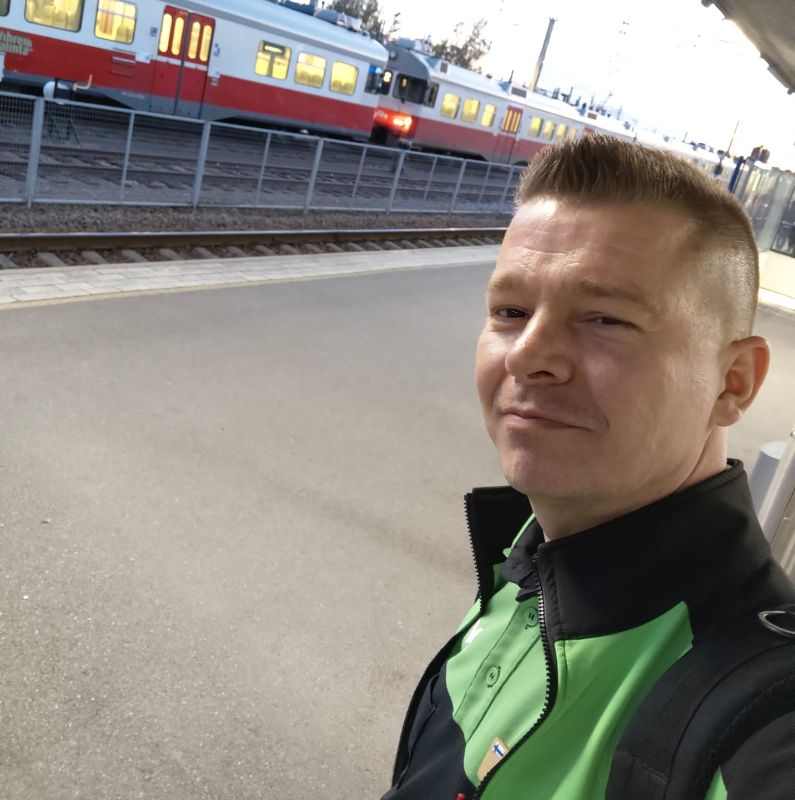Train conductor
"I would especially recommend this profession to people who are interested in trains and related technologies and working with people. Keep your mind open to new things and acquaintances. That is the attitude you need as a conductor."

- Jaakko Rainio
- Train conductor at VR-Yhtymä Oyj.
- Graduated as a commuter train conductor from a conductor course organised by the employer and later as a conductor for long-distance traffic.
- Ten years of work experience in the field.
Briefly explain what you do for a living.
I work as a conductor on VR’s long-distance trains. My duties include taking care of passenger safety, providing customer service and checking tickets. I am responsible for getting customers from one place to another as smoothly as possible, for example by arranging transfer connections. Before departure, I inspect certain technical aspects of the train and make sure that the train is in shape to take customers on board safely.
How have you ended up in the profession of your choice?
During my university studies, I worked at Finland’s Slot Machine Association (RAY). I changed majors a few times, took study leave and continued working at RAY. At some point, staring at the roulette table every night started to get old. I applied for a position as an on-board ticket clerk with VR Group, and I was picked for the job. I worked as a ticket clerk for some time, until they discontinued that role entirely. By then, I had become fond of working on the railway, so I applied for a conductor course in commuter traffic organised by VR.
Describe your typical working day or week.
A typical workday starts early in the morning, for example at 4 am. The shift starts with inspecting the rolling stock inside and out. When everything is in order, we welcome the passengers. During the day, we inspect tickets, look for lost luggage, arrange transfer connections for customers and deal with life in any way you can think of. We face unexpected situations and encounter all kinds of people every week. Sometimes we also have to manage disorderly people.
What kind of work environment or working hours do you have?
My work environment is made up of the train, railway yard and station area. A conductor might also sometimes have to go between the carriages to do some technical maintenance. I should note that you have to stand and walk a lot in this job.
Conductors do irregular three-shift work. The length of a workday varies between 6 and 15 hours, but the most typical shift is 10 to 14 hours. You could work on any of the seven days in a week. Long shifts also mean long periods of time off. At Joensuu, we do not have too many night shifts, so in that sense, Joensuu is a good workplace for me.
What kind of competence or qualities are required in the profession?
A conductor should have an optimistic attitude and an open mind. I would say that you have to be curious and interested in meeting different kinds of people. Conductors are an easy-going professional group that manage many kinds of situations with their personalities.
What is the best thing about your profession?
Variability, because no workday is the same. It feels rewarding when I get people to their destination safely in a challenging traffic situation.
What are the downsides of the profession or what seems challenging?
Sometimes you get a stretch of 4 to 5 workdays in a row, which may take a bit more stamina than normal. Still, I do not feel that there is anything particularly annoying for me in this job.
What would you tell a person considering the profession of a train conductor?
I would especially recommend this profession to people who are interested in trains and related technologies and working with people. Keep your mind open to new things and acquaintances. That is the attitude you need as a conductor.
How do you see the future of your profession?
Over the past ten years, the digital leap in conductors’ work has been huge. I am sure that this development will continue in the future as well. Nevertheless, I believe that we have a steady future as a profession.
